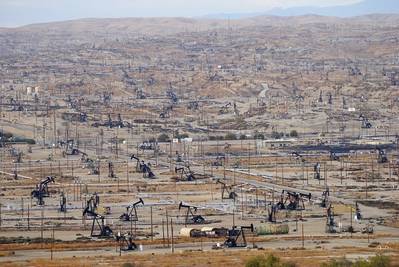Oil Falls, OPEC Supply Worries
Oil benchmarks fell on Wednesday after an unexpected build in U.S. crude and gasoline inventories despite strong demand, and as traders weighed the possibility of an increase in OPEC crude output to cover any shortfalls in supply from Iran and Venezuela.
U.S. crude inventories rose 5.8 million barrels last week, while gasoline stocks increased by 1.9 million barrels, the Energy Information Administration said.
Both builds were unexpected, as a Reuters poll called for a drawdown in both figures as summer demand starts to heat up. Overall demand for refined products in the United States has kept refining activity buoyant, helping drain crude inventories in the world's largest consuming nation.
“A 5.8 million-barrel build is kind of like a slap in the face, where it’s like, 'Where did this oil come from?’ And as you look through the numbers, it doesn’t make a lot of sense," said Phil Flynn, analyst at Price Futures Group in Chicago. "It is definitely a shock to the system.”
The increase in U.S. inventories came from a combination of reduced exports and rising imports; the latter is somewhat surprising, Flynn said, because Brent crude is currently trading at a $7 premium to U.S. crude <0#WTCLc1-LCOc1>, making exports more advantageous right now.
Brent crude futures were trading $1.08, or 1.4 percent, lower at $78.45 a barrel as of 10:54 a.m. EDT (1454 GMT), while U.S. crude lost 85 cents to $71.35 a barrel.
Across the broader financial markets, investors dumped equities and other industrial commodities in favour of the Japanese yen, U.S. and German government bonds and gold, as concern mounted that setbacks to U.S.-China trade talks would undermine increasingly fragile-looking world growth.
Oil prices have gained nearly 20 percent this year, with Brent briefly rising above $80, driven primarily by coordinated supply cuts by the Organization of the Petroleum Exporting Countries and partners including Russia.
OPEC may decide to raise oil output as soon as June due to worries over Iranian and Venezuelan supply and after Washington raised concerns the oil rally was going too far, OPEC and oil industry sources familiar with the discussions told Reuters.
"It does seem like any move above $80 attracts selling interest right now and that could potentially lead us to a period of consolidation, where I think $77.50 or even $75 might be in focus," Saxo Bank senior manager Ole Hansen said.
The price has also been affected by rising geopolitical tensions that could dent global output just as demand is set to hit 100 million barrels per day in the final quarter of this year, according to the International Energy Agency.
In addition, the United States plans to reimpose sanctions on major oil producer Iran, while an economic crisis has decimated Venezuela's crude output.
With uncertainty over how sanctions might affect Iranian supply, fund managers have cut their holdings of crude futures and options by more than 10 percent in the last seven weeks to the lowest level this year.
Rising supply in the United States has limited the upward move in prices. U.S. crude output last week rose modestly to 10.7 million bpd, a record, keeping it in second place behind Russian production at 11 million bpd.
By David Gaffen, Additional reporting by Stephanie Kelly in NEW YORK, Amanda Cooper in LONDON, Naveen Thukral and Jessica Jaganathan in SINGAPORE









